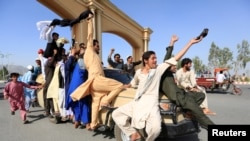The United States is pushing hard to take advantage of the momentum for peace talks generated in Afghanistan due to a brief cease-fire during the Muslim holy festival of Eid last month.
"I think it creates this impulse for everyone to renew their efforts to find a negotiated political solution," Alice Wells, the principal deputy assistant secretary for the State Department’s Bureau of South and Central Asian Affairs, told reporters in Kabul according to AFP.
Wells visited Afghanistan and Pakistan for four days starting Saturday, in an effort to rally the stakeholders to push forward on a negotiated settlement between the warring factions in Afghanistan.
"The support that we saw, not just from the Afghan people but from the Taliban commanders and foot soldiers was extraordinary," she said, describing the way the Afghan public, security forces, and even Taliban reacted to the cease-fire.
Many Taliban fighters took advantage of the cease-fire to head to the cities. Local media and posts on social media showed them enjoying ice cream, taking selfies, and offering Eid prayers with their battlefield enemies in the Afghan security forces. Several of them told reporters they were tired of the war. It was the first time since the war started that both sides had agreed to put down their weapons for three days. However, when President Ashraf Ghani extended the cease-fire, the Taliban refused to follow suit.
Ghani has offered the Taliban unconditional talks but the Taliban refuse to negotiate with him, calling his government a puppet regime. They want to talk directly with the United States and demand a withdrawal of foreign forces from Afghanistan.
"The only path to rescuing ourselves from all these calamities is for all American and other occupying forces to leave our country and for an independent, Islamic, intra-Afghan government to take root," an Eid message from Taliban leader Mawlawi Hibatullah Akhundzada read.
A statement from U.S. Secretary of State Mike Pompeo around the same time hinted that his country was willing remove this obstacle by agreeing to discuss troop withdrawal.
"As President Ghani emphasized in his statement to the Afghan people, peace talks by necessity would include a discussion of the role of international actors and forces. The United States is prepared to support, facilitate, and participate in these discussions," the statement said.
Wells said this took away "all of the objections the Taliban have about why they are not prepared to engage with the Afghan government."
Richard Olsen, former U.S. special representative for Afghanistan and Pakistan, said the principal focus of U.S. diplomacy was to find a negotiated political settlement with the Taliban and "Alice is particularly very focused on it."
He also thought the Eid cease-fire, which showed the Taliban leadership had control over its cadre, increased pressure on Pakistan to "deliver the leadership."
The United States and Afghanistan have long claimed that the leadership of the Afghan Taliban lives in Pakistan. While Islamabad denies that charge, U.S. officials continue to push back.
"Right now it’s the Taliban leaders, and frankly it’s Taliban leaders who aren’t residing in Afghanistan, who are the obstacle to a negotiated political settlement," Wells said in Kabul according to Reuters. She added that the United States had "not yet seen that sustained and decisive action on the part of Islamabad" that it was looking for.
The U.S. South Asia strategy as far as Pakistan is concerned is a one-point agenda: to deal with the Taliban and the Haqqani Network," said Moeed Yusuf, the associate vice president of the Asia center at the U.S. Institute of Peace, a Washington based think tank.
The U.S. demand, he explained, is to either bring them to the table and negotiate seriously, or neutralize them by killing, arresting, or expelling them from Pakistan.
"I don’t think anything else has been put on the table this trip or will be put on the table till this particular irritant is removed," he said.
In Islamabad, Wells met with multiple ambassadors, including several Europeans, the Chinese, and the Afghan ambassador, according to a U.S. embassy official.
The Europeans are important NATO allies of the U.S. in Afghanistan. They would need to be on board in any conversation on a peace process or a political settlement, according to Yusuf.
Afghanistan's ambassador to Pakistan, Hazrat Omar Zakhilwal, has been pushing for a peace process for a while, and the Chinese meeting may be an effort to re-invigorate a group of the United States, China, Pakistan, and Afghanistan that has been dormant for two years, according to Olsen. The four nation group was formed to convince the Taliban to join peace talks.
"All of this suggests to me movement for a peace process," Olsen said.
The statement issued by the U.S. embassy in Islamabad said the visit "focused on the role that Pakistan can play in achieving a peaceful resolution to the conflict in Afghanistan."
A similar statement from the spokesman of Pakistan’s military said that the two sides "reaffirmed the commitment towards the common goal of peace and stability in the region and discussed measures towards that end."

